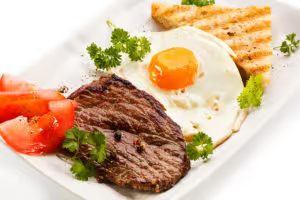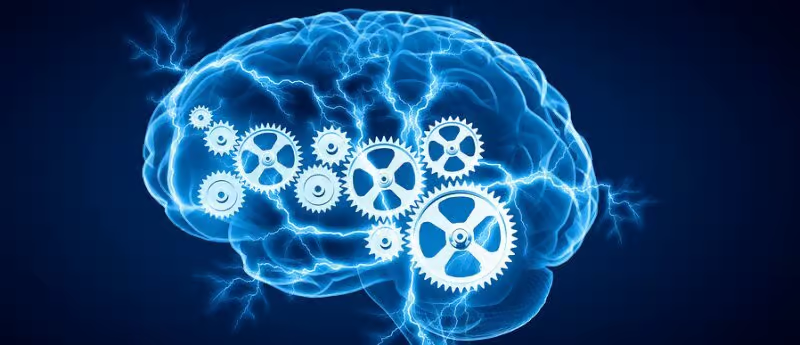Table of Contents
Phosphatidylcholine (PC, or Ptd-Cho) is one of two fatty acids that make up the outer layer of the membrane covering each of the 70 trillion cells in your body.
Phosphatidylcholine is also converted in your body through a process called hydrolysis to make up the fatty acids AA, oleic, linoleic, linolenic, and DHA. These fatty acids contribute to the signaling within and between brain cells for long-term potentiation (LTP). LTP is behind the formation of long-term memories.
The synthesis of the neurotransmitter acetylcholine (ACh) is largely dependent on the choline provided by Phosphatidylcholine. ACh is critical for cognition, learning and memory.
When you don’t have enough Phosphatidylcholine, brain cell membranes lose integrity and eventually die.
Some Phosphatidylcholine (PC) is naturally synthesized in your body. We also get PC from some of our food including beef, oysters, eggs and some vegetables. As a nootropic supplement, Phosphatidylcholine is derived from lecithin found in soybeans and sunflower seeds.
Note that lecithin and Phosphatidylcholine are NOT the same thing. Plain lecithin is not an efficient source of Phosphatidylcholine or choline. As a nootropic, look for as pure of a source of Phosphatidylcholine (PC) as you can afford.
Phosphatidylcholine helps:
- Neuroprotection: Phosphatidylcholine (PC) is a major component of brain cell membranes. And neurons use some of this choline to synthesize acetylcholine (ACh). Supplementing with PC restores the PC that is needed for brain cell membrane integrity. While providing neurons with the ACh needed for memory and learning.
- Neurotransmitters: Phosphatidylcholine increases concentrations of choline and acetylcholine in the brain. Improving memory and cognition.
- Neurogenesis: Phosphatidylcholine helps restore damaged brain cells. Making them more fluid and permeable allows the proper flow of chemical messengers and nutrients into and out of the cell. And improving overall cell function and efficiency. Resulting in better cognition, learning, memory, and mood.
Overview
Phosphatidylcholine (PC, or Ptd-Cho) is a phospholipid that plays a critical role in every cell in your body. Including your brain.

Your brain cells are each encased in a membrane. This bi-lipid layer of two fatty acid tails face each other. The outer layer of each cell contains mostly the phospholipids phosphatidylcholine (PC) and sphingomyelin, while the inner layer contains predominantly phosphatidylserine (PS), phosphatidylinositol, and phosphatidylethanolamine.
The outer layer of each cell membrane is highly permeable. But the inner layer is much less permeable. These two fatty acid tails are in a constant state of movement, vibrating at millions of times a second. This continual vibration could be considered the ‘backbone of life’. And is the basis of everything that happens in your brain.
The amount and type of long-chain fatty acids in your diet affects the composition of these cell membranes. The structure and function of your cells depend on the ideal balance of fats including cholesterol, oleic, palmitic and stearic fatty acids. And essential fatty acids like Omega 3. Without this proper balance, cell membrane function is compromised.
And you can be sure that our modern diet does not provide the ideal balance of fatty acids (phospholipids) to maintain brain cell integrity. It’s why you experience brain fog, memory loss, slow thinking and poor decision making.
Some progressive health care researchers and practitioners have found that supplementing with phosphatidylcholine (PC) can lessen the symptoms of diseases like MS, diabetes, immune system problems, asthma, and neurodegenerative diseases like Alzheimer’s.
You naturally get phosphatidylcholine (PC) from foods such as beef, eggs, oysters, broccoli and brussel sprouts. Supplemental phosphatidylcholine (PC) is made from lecithin found in soybeans and sunflower seeds.
Phosphatidylcholine (PC) maintains the integrity of brain cell membranes. And is directly involved in acetylcholine (ACh) synthesis. ACh is needed for cognition, learning and memory formation.
How does Phosphatidylcholine work in the Brain?
Phosphatidylcholine boosts brain health and function in several ways. But two in particular stand out.
- Phosphatidylcholine is needed for long-term memory. The hydrolysis of Phosphatidylcholine (by a process called phospholipase A2-catalyzed hydrolysis) is used to make the free fatty acids AA, oleic, linoleic, linolenic and DHA.
These free fatty acids facilitate synaptic transmission by targeting nicotinic ACh receptors using protein kinase C (PKC). This messenger system is needed for long-term potentiation (LTP). Researchers have determined that these fatty acids are critical for learning and memory.[i]
- Phosphatidylcholine helps repair neurons. Cholinergic neurons are unique among cells because they serve two functions. PC is a major component of brain cell membranes. And serves as a storage pool for the choline needed as a precursor for acetylcholine (ACh) synthesis.
Researchers demonstrated how this works. They incubated human cholinergic cells in the lab. And followed the metabolic link between membrane composition and turnover, and ACh synthesis. And proved that ACh is synthesized from choline derived from the degradation of Phosphatidylcholine.
If there is not enough choline available to maintain brain cell membrane integrity, and to synthesize the neurotransmitter acetylcholine, brain cell function breaks down. You experience brain fog, poor memory and decision making. And ultimately leading to neurodegenerative diseases like Alzheimer’s, and other motor neuron disorders.[ii]
How things go bad
As you get older, your brain chemistry and energy metabolism changes. This can happen at any age once you enter your adult years. Low Phosphatidylcholine levels have even been found in newborn babies.
↓ Brain cell membranes degenerate
↓ Recall, reaction time and mood diminish
↓ Acetylcholine levels decline
All of these changes can happen at any age. Your body is influenced by the food you eat, what you drink, lifestyle habits, the air you breathe and more.
So Phosphatidylcholine can help for age-related cognitive decline, as well as a student looking to do better in school.
Phosphatidylcholine benefits
Phosphatidylcholine (PC) has been around as long as humans have walked this planet. PC is a critical component of the top layer of the membrane surrounding each one of the cells in your body.
And yet some are talking about Phosphatidylcholine as the “New Wonder Drug”. How could this be? Turns out that PC is a fatty acid. As are many of the fats you consume in your modern diet.
Long-chain fatty acids affect the composition of your cell membranes. When you eat bad fats your cell membrane fluidity is affected, ion channels disrupted, hormones, regulation of neuroreceptors, signaling and other signaling chemicals are affected.
Incorrect amounts or types of long chain fatty acids can lead to a cascade of serious health and cognition problems.
The easiest and simplest way to correct many of these cognition problems is to supplement with Phosphatidylcholine as a nootropic. You’ll feel better as cells are repaired. Digestion issues could be eliminated or minimized. And brain fog, cognition and memory problems could become a non-issue.
How does Phosphatidylcholine feel?
If you eat a perfectly healthy diet and are in optimal physical and mental health, using Phosphatidylcholine may not do anything for you.
But if you’re like most in the Western world relying on fast food, processed food and other unhealthy lifestyle habits, then PC may help.
Neurohackers report that supplementing with Phosphatidylcholine lifts brain fog, improves working memory and boosts alertness.
Others say it helps them prevent anxiety and panic attacks. Mental clarity is improved, and energy levels rise.
Ray Kurzweil, the famous inventor and futurist, gets phosphatidylcholine intravenously once a week at his health clinic. His theory is that this will rejuvenate all his body’s tissues.[iii]
Phosphatidylcholine Clinical Research
A double-blind study in California with 80 college students investigated the effect of Phosphatidylcholine on memory. The students received a placebo or either 10 or 25 grams of Phosphatidylcholine (PC). 25 grams of PC was estimated to supply about 3.75 grams of choline.
Memory was tested at 60 and 90 minutes after taking PC. The researchers recorded a significant improvement in memory after 90 minutes, and only a slight improvement after 60 minutes.
This 1993 study was the first to test the relationship between a single dose of Phosphatidylcholine on memory in healthy human subjects.[iv]
Phosphatidylcholine Prevents Brain Cell Death
Streptococcus pneumonia is the most common cause of bacterial meningitis. And is the most common cause of death from pneumonia. If it doesn’t kill you, it can cause paralysis, mental retardation and learning disorders.
In humans, it’s your hippocampus neurons that are the first to die as a result of meningitis. Cell death is officially called “apoptosis”. But I’m using cell death to drive a point home.
Phosphatidylcholine (PC) is an essential component of your cell membranes. And a deficiency of PC, either from chemicals, disease, or bad nutrition leads to cell death. And the first to go are your hippocampal neurons. The same neurons used for learning and memory.
Researchers in Tennessee found that a variety of brain cells die after you get pneumonia. Because it interferes with Phosphatidylcholine synthesis. And apoptosis inhibitors can’t even stop this cell death from happening.
The research team determined that the only way to prevent cell death from pneumonia infection was supplementing with Phosphatidylcholine. Even after the infection set in.
The researchers concluded that supplementing with Phosphatidylcholine was the best way to prevent what they called an “apoptotic cascade”. And the best therapeutic intervention.[v]
Phosphatidylcholine Improves Memory
Studies on the effect of Phosphatidylcholine on memory are limited. So researchers in Japan decided to remedy this lack of data by testing PC in mice with dementia.
They administered PC to mice with dementia and to normal mice. And compared differences in memory, choline and acetylcholine concentration, and choline acetyltransferase (ChAT) activity. ChAT is the enzyme responsible for the synthesis of acetylcholine in the brain.
The researchers found that giving phosphatidylcholine for 45 days to mice with dementia improved memory. And generally increased brain choline and acetylcholine concentrations to or above the levels of the normal control mice.
The research team concluded that phosphatidylcholine increases brain acetylcholine concentration and improves memory.[vi]
Phosphatidylcholine recommended dosage
Recommended Phosphatidylcholine dosage is 1,200 mg to 5 grams per day. And divide your total daily dose into 2 or 3 equal doses and dosed throughout the day.
To enhance bioavailability and boost absorption, take PC 30 with a meal or tablespoon of unrefined coconut oil or extra virgin olive oil.
Do not take Phosphatidylcholine with acetylcholinesterase (AChE) inhibitors since this combination may excessively increase acetylcholine (ACh) levels and potentially cause cholinergic side effects. AChE inhibitors include donepezil (Aricept), Tacrine (Cognex), rivastigmine (Exelon) and Huperzine-A.
Phosphatidylcholine Side Effects
Phosphatidylcholine is naturally produced in your body and is considered well tolerated and safe. PC is not toxic.
Some may experience sweating, stomach upset and diarrhea. Particularly if you’re already high in choline.
Type of Phosphatidylcholine to buy
Phosphatidylcholine is sold in tablet, capsule, liquid and powder form. Capsules can run from 420 – 1,300 mg each. 500 mg of Phosphatidylcholine in powder form is equivalent to 2-level 1/8 tsp scoops.
Phosphatidylcholine is sometimes used interchangeably with “lecithin” which is misleading and simply not accurate. Choline is a component of phosphatidylcholine, and is also found in very small amounts in plain lecithin. Although closely related, these terms are not the same.
You will experience the nootropic benefits by supplementing with Phosphatidylcholine but not with lecithin.
Nootropics Expert Recommendation
Phosphatidylcholine 1,200 mg to 5 grams per day
 I recommend using Phosphatidylcholine (PC) as a nootropic supplement.
I recommend using Phosphatidylcholine (PC) as a nootropic supplement.
Phosphatidylcholine helps build and repair cell membranes. And is found in every one of the 70 trillion cells in your body.
You can get Phosphatidylcholine from some of the food you eat. But Phosphatidylcholine is only found in foods like beef, eggs, oysters and some vegetables. PC levels decline as you age and you are unlikely to get nearly enough through diet. So to get its benefits you must take it as a nootropic supplement.
Phosphatidylcholine is vital to maintaining optimal brain health. And has been shown to increase cognitive energy, boost brain function, enhance communication between neurons, and protect neural membranes from free radical damage.
I suggest starting with a dose of at least 1,200 mg daily. Phosphatidylcholine is a great compliment to a stack including any nootropic from the racetam-family. Anything that causes an increase in uptake of acetylcholine in your brain.
You need to provide your brain with the choline it is demanding. Or it starts cannibalizing your own brain cells to make more acetylcholine. Signs that you’re lacking adequate choline or acetylcholine are headaches.
Use Phosphatidylcholine at a ratio of 1:4. For example, 250 mg of Phosphatidylcholine to 1,000 mg of Aniracetam.
If you have liver damage like cirrhosis, you may want to increase the dose up to 4.6 grams per day for liver repair.








Join The Discussion - 141 comments
sher
February 19, 2021
I purchased Double Wood Phosphatidyl Choline supplement. The front label says 1200 mg. The back supplement facts says phosphatidyl choline COMPLEX 1200 mg providing – Phosphatidyl Choline 420mg. other ingredients gelatin (shell) glycerin and water. contains soy. 1 soft gel equals one serving. I am confused, do I have 400mg or 1200mg? I feel they are two strong. I get a headache and irritable if I take them more than 1 every 3 or 4 days. I am working on improving energy, fatigue and brain fog. All life long issues. Have had great success with sam-e, L-tyrosine, B complex, thyroid and a keto style diet. I been doing this recent stack for 7months and it is working for fatigue and energy. I need to work on recall and motivation.
David Tomen
February 20, 2021
Sher, I’m not familiar with that particular supplement although I like Double Wood Supplements. The thing is there is no indication on the label or their website what accounts for the other 800 mg in that capsule. Whatever that is could be causing your problem. Or it could be you are reacting to PC and it’s not for you.
Why don’t you try instead something like Mind Lab Pro (https://bit.ly/3lh3w8a) or Performance Lab Energy (https://bit.ly/3ifR1XJ)? Mind Lab Pro helps with recall and motivation but in a gentle way. And Performance Lab Energy provides pure, clean energy in two capsules.
It’s either that or read my article on motivation and put together your own stack based on that article here: https://nootropicsexpert.com/hacking-motivation-with-nootropics/
André Leroux, from France
January 8, 2021
Hi David,
I am 70 and was suffering from chronic fatigue and depression. I have been taking Fish oil, Magnesium-L-threonate, vitamin D, Life Extension Two-Per-Day Tablets (zinc, B vitamins, etc) and phosphatidylcholine for about 6 weeks. I am feeling much better now. Chronic fatigue and depression are over.
Now I intend to add: DMAE (for lipofuscin on my hands), Alpha-Lipoic Acid, Phosphatidylserine, Ubiquinol with PPQ (from Life Extension), NADH, Gotu Kola and Rhodiola.
Do you think that’s a good stack?
Best regards
and A Happy New Year, David 🙂
André
David Tomen
January 8, 2021
André, sounds like you are making progress. I suggest adding Alpha GPC or CDP-Choline (Citicoline) to support DMAE along with L-Carnosine. And you would likely benefit from using L-Tyrosine for dopamine as well.
André Leroux
December 29, 2020
Hi David, is Phosphatidylcholine better than Alpha-GPC and CDP-Choline?Best regards
André
David Tomen
December 30, 2020
André, none of these nootropics “are better than …”. It depends on which one works best for you.
If you’re looking to raise acetylcholine levels then use either Alpha GPC or CDP-Choline. Some prefer one over the other because one works better for them than the other. I use both with great success.
If you want to keep your brain cells healthy and flexible, or they need repair, then PhosphatidylCholine is a great choice. It also has the added benefit of providing a choline molecule on demand if acetylcholine levels are low in your brain. So it does double duty.
But the first two are the best choice for increasing acetylcholine.
André Leroux
January 2, 2021
Thank you David. I’ll take phosphatidylcholine
Best regards. André.
Obi
November 8, 2020
Hello, I was looking for a good PC supplement and stumbled across a site called ”PipingRock.” Do you have any experience with their products?
Their products seem to be affordable but I wonder if quality is being compromised for quantity
David Tomen
November 8, 2020
Obi, the Piping Rock PC supplement looks to be pure as it has no toxic “other ingredients”. And they have a comprehensive testing program in place. The only other thing you should check is the user reviews of the supplement you are considering. If those are positive then you’ve found a good source.
Benyamin
September 11, 2020
I had been on Lansoprazole 60mg a day from 22 may 2020 until 31st of aug 2020, for acute Gastritis, it has damaged my liver, Hepa Toxicity. I have liquid n capsules PC, i also use CDP choline 250mg to 500mg a day with mind lab pro. Shall I start taking 4.6g a day in 3 doses of PC? Or shall minus the other sources of choline like bitartrate, CDP and GPC please advise as my GP don’t care i have told him, he said wait.
David Tomen
September 11, 2020
Benjamin, keep in mind that I’m not a doctor and don’t even play one on TV. So take my advice with that in mind please. If I was in your shoes I think I’d put aside the other choline sources for now.
But it’s what your system can tolerate. You’re keeping your liver health in mind. But you also need to be aware of your acetylcholine levels. Excess ACh levels will cause problems too.
Serge
August 28, 2020
Hello David
Can Phosphatidylcholine lowers prolactin levels?
Thanks
David Tomen
August 29, 2020
Serge, it may reduce prolactin levels. It does in animal studies. Not sure if this has been verified in humans.
Bob
August 24, 2020
What is the difference between Phosphatidylcholine, Citicoline and Alpha GPC in regards to getting more choline into the brain.
There is a huge price difference between the three, PC being the lowest cost but for working memory and concentration issues would all work about the same if the issue is acetylcholine related?
David Tomen
August 24, 2020
Bob, because they each work very differently in your body and brain. I have list of every supplement I can think of the is considered to have cholinergic action in this post: https://nootropicsexpert.com/advanced-guide-to-acetylcholine-supplements-in-nootropic-stacks/.
You find links to the full review of each of the ones you mentioned in that post. I suggest doing a little homework and reading those reviews. Because it’s the only way you’ll begin to understand how these supplements differ. Don’t worry, I had to do the same thing at some point.
BTW, Phosphatidylcholine is not necessarily the “lowest cost” choline supplement. Not if you’re going with a quality supplement derived from sunflower lecithin.
Bob
August 26, 2020
Thanks for the link.
It links to this article which is what i really needed.
https://nootropicsexpert.com/advanced-guide-to-choline-in-nootropic-stacks/
I am curious why PC from sunflower is preferred to soy sourced?
David Tomen
August 26, 2020
Bob, it’s just a cleaner source. Some are sensitive to soy and there are studies showing it’s ‘not good for you’. Especially GMO soy.
I figure that when putting something in my body I should respect it enough to use the best versions of these supplements I can get. I’ve only got one body. And I like to think it deserves the best.
Bill Hunsinger
July 10, 2020
I am a retired semiconductor device research scientist. I have been following your professional detailed explanations with great interest as I note the similarities between cellular processes and semiconductor junctions.
This line: ” These two fatty acid tails are in a constant state of movement, vibrating at millions of times a second. This continual vibration could be considered the ‘backbone of life’. And is the basis of everything that happens in your brain.” Caught my attention.
Are there references where I can learn more about this phenomena.
Dr. Bill Hunsinger
David Tomen
July 12, 2020
Dr. Bill, I believe I got this from the book “Biology: The Dynamic Science” page 108 (https://amzn.to/2CoBHc6). The words are mine but the ideas are thanks to researchers like Peter Russell, Paul Hertz and others. The “backbone of life” is referring to fatty acid carbon chains.
We have plenty of research published now on cell membranes. Here are just 3 examples: https://www.ncbi.nlm.nih.gov/books/NBK9928/, https://www.ncbi.nlm.nih.gov/books/NBK26871/, and https://www.ncbi.nlm.nih.gov/pmc/articles/PMC3759861/.